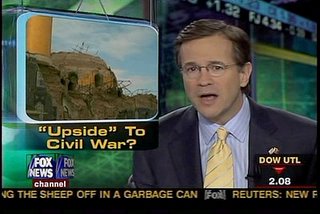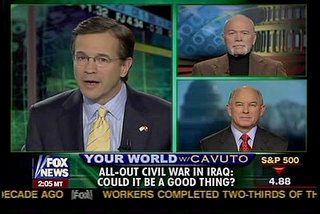by Joe Miller
A week or so ago, I
criticized Edward Feser's account of preventive war (see Feser's original posts
here and
here). Professor Feser was good enough to reply to several of my points via a very nice (indeed, much nicer than my own post had been) e-mail. He has graciously allowed me to reprint those points here. As this sort of interaction (that is, feedback from other philosophers, whether professional or not) is exactly what I had hoped for in starting the blog for class, I'd be really quite remiss if I failed to get this posted as soon as possible.
I hope that my students will take advantage of the opportunity to read and then comment on Prof. Feser's posts. I would suspect that you'll get some excellent feedback. From reading some of his other writing, I suspect that he and I disagree on a number of issues. Those of you who disagree with me regularly (hi Rick) may well find much to like. Keep in mind of course, that I'm the one who controls your grade. I'm kidding of course. This site is going to get me fired yet.
Anyway, here are the comments. Gotta get them posted before it gets too much later. About half of the regular readership of this blog will be over soon for some food and some conversation that is...how shall we say it?...perhaps a bit more lubricated than our usual seminars. So here goes (Ed's comments are indented. Like I had to specify that. Sorry).
1. Please keep in mind that my arguments were directed specifically against paleoconservatives who have characterized the war as a "manifest injustice," damned the administration as moral monsters, etc. Even more specifically, they were directed against the book I was reviewing and the sorts of people who were likely to sympathize with the (largely Catholic-oriented) arguments in that book. I was not addressing left-of-center critics, or critics of any political stripe who have been more moderate in their arguments. So I did not expect what I said to be completely applicable to, or even very convincing to, other critics of the war. (For instance, I'm sure many critics of the war couldn't care less about what the pre-Vatican II manuals I cited have to say.)
That’s fair, and it’s a big part of the reason that I don’t address large portions of your review. I don’t particularly care what pre-Vatican II manuals have to say about war. Indeed, not being a Catholic (or a theist for that matter), I don’t particularly care what the Catholic Church has to say about war at all. Or rather, insofar as the Church’s position is grounded in reason rather than revelation, I’m interested. Where the ultimate reason for holding X boils down to “X is consistent with the teachings of Christ” or “X is endorsed by Paul,” well then at that point, we’re no longer doing philosophy, so I’m just not all that interested. We analytic types replaced the Scholastics for good reason.
:)
2. I am aware that there is an important difference between "pre-emptive" and "preventive" wars. But unfortunately the terms have come to be used interchangeably by many who have written on the war in Iraq (either pro or con), and this sloppy usage sometimes appears in the book I was reviewing. Since it wasn't relevant to the points I was making, and the posts were long enough as it is, I didn't bother to get into the distinction. Still, you're right that I should have made the distinction anyway.
This may be the only really fair point that I made in the entire post. The rest needed at least a bit more elaboration. And tact.
3. The silly definition of "preventive war" that I was criticizing is, I think, quite common, though probably not among the serious writers on just war theory you're used to reading. I was largely addressing more journalistic arguments made by political writers. And Fr. Juan Iscara, the one contributor to the volume I was reviewing who makes an attempt to say something substantive on this matter -- he emphasizes the "preemptive/preventive" distinction, for example -- discusses "preventive war" as if it meant what I said it does not mean. He says, for example, that it involves reacting to the "mere possibility of, or potentiality for, a future attack" or to "what is, at present, only the mere possibility of a future attack by a potential adversary"; that it is intended "to prevent a threat that such a country may or may not present in the future, but which we fear it may"; that it involves "our own assessment of his possible future intentions" and "guesswork"; and so forth. It was this kind of thing that I had immediately in mind in writing what I did.
Here’s my worry. It’s that, according to a whole lot of pretty serious writers on just war theory, preventive war really does mean something pretty close to what Fr. Iscara is claiming. While prevention is often defined in more general terms, serious definitions from serious writers would, at the very least, entail that a nation could do all of the things that Fr. Iscara says prevention involves. “Guesswork” is way too loose, but the rest of the claims you quote…well, they just are what prevention involves. You can say that that’s not what you mean by prevention, but that’s pretty much what the term itself does mean. If you want to redefine the term, that’s fine. You would, of course, need to offer some argument as to why your definition is better than all the others out there (see my response to your next point). It’s simply not fair to pretend as if the usual understanding of “prevention” is just knee-jerk anti-Bush rhetoric.
4. What I describe as a reasonable understanding of preventive war was indeed, as you speculate, meant to be understood specifically as the Bush administration's understanding and the understanding of the war's defenders, rather than as a definition that past theorists have used. (I would have thought that the "freakin' date" you refer to, i.e. 9/11, would have made that obvious!)
Yes, of course it’s rather obvious what you meant. I’m still pretty puzzled, though, why this seems like a reasonable thing to do. It’s fine to object to a bad formulation of preventive war. I would think, though, that the proper response would be to offer a better formulation. That would mean appealing to definitions that past theorists have used. If you want to then go on to argue that we ought to reject those past theories in favor of something different (and the formulation that you give is different from standard accounts of prevention and/or pre-emption), then that would be interesting. But it would also really need to be done. Just jumping straight to Bush’s own idiosyncratic definition is an odd move.
5. Your paraphrase of my formulation (at the end of your post) is, I think, not fair, for two reasons. First, it seems clear that at least according to the authors I was citing, violating the terms of the 1991 cease-fire _would_ constitute a casus belli, at least all things being equal. Second, this "all things being equal" is crucial: while violating such terms would by itself be a presumptive reason to go to war, this consideration could of course be overridden if it looked like the good of enforcing the terms might be outwighed by the evils typically associated with war. (This, I suggested, is why the war's defenders have also put emphasis on liberating the Iraqis from Saddam's tyranny, since this could plausibly be said to neutralize fears that the costs of enforcing the terms would outweigh the benefits.) Surely that's not as morally objectionable as you imply my formulation is.
Okay, I concede Feser’s first point. It’s true that, according to the authors Feser cites, violating the terms of the 1991 cease-fire does indeed constitute a casus belli. What I would deny, however, is the relevance of their so considering. It is irrelevant because, quite frankly, it is just flat wrong. Let me be clear here: violating the terms of a cease-fire can be a casus belli. As I have argued elsewhere, though, the violation of an agreement between Iraq and the United Nations Security Council gives the Security Council the right to resume hostilities (or to authorize a third party to resume hostilities on its behalf).
But if the Security Council declines to reinitiate hostilities, the violation quite simply does not authorize any third party to act unilaterally to enforce the agreement. No one who defends the war would buy this sort of argument in domestic law: I simply cannot sue you for breaching a contract with my brother after my brother has quite explicitly declined to file a suit against you, and it’s hard to imagine a sane legal system that would allow such suits. My case would be dismissed for lack of standing. Similarly, if I am a minority shareholder in a corporation that is the victim of a breached contract and the corporation, after holding a shareholder vote, decides not to pursue a lawsuit, I cannot sue unilaterally and claim to be enforcing the contract on behalf of the corporation.
In other words, I would deny that the violation of its 1991 cease-fire actually constitutes a casus belli for the United States. Since Feser has formulated his account of pre-emption as being explicitly targeted at the United States’ invasion of Iraq, then I think that it is perfectly fair to point out that, in that particular invasion, the U.S. lacked anything that would count as a casus belli. Perhaps, however, I should amend my paraphrase to read: We have the right to attack a country that has done a wrong act that, in and of itself, does not amount to a casus belli for us because we think that it could potentially do something harmful to us in the future. That more accurately describes the Iraq invasion. And it’s still pretty morally objectionable.


